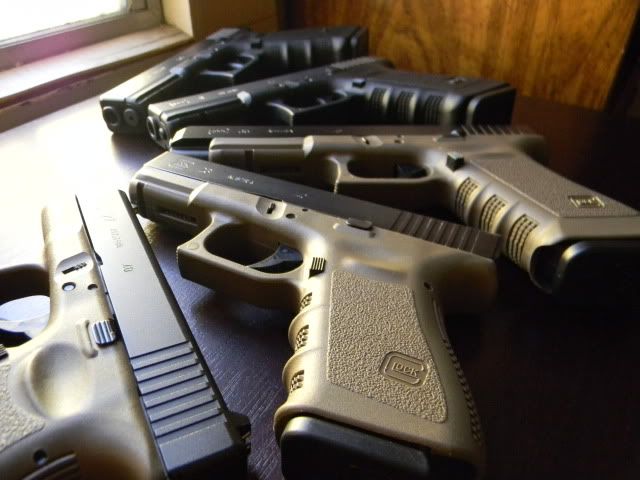I was wondering if it would be harmful to leave my triggers in the "ready" position for long periods of time???...or should I always dry-fire my Glocks before putting them away???

Should i dry-fire my glock before putting it away???
-

Glocktalk is a forum community dedicated to Glock enthusiasts. Come join the discussion about Glock pistols and rifles, optics, hunting, gunsmithing, styles, reviews, accessories, and more!
1 - 20 of 24 Posts
No dry fire needed as the firing pin is not tensioned until you pull the trigger. When "cocked" the pin is actually resting against the pin safety block until you pull the trigger. The take up you feel is the pin being pulled back building spring tension.I was wondering if it would be harmful to leave my triggers in the "ready" position for long periods of time???...or should I always dry-fire my Glocks before putting them away???
Sent from my DROID RAZR using Tapatalk 2
What planet are you from? :freak:No dry fire needed as the firing pin is not tensioned until you pull the trigger. When "cocked" the pin is actually resting against the pin safety block until you pull the trigger. The take up you feel is the pin being pulled back building spring tension.
Actually, with the gun in the "ready" state the striker spring is partially tensioned. The first, lighter, part of the trigger pull tensions it the rest of the way.
Leaving the spring partially tensioned will not hurt it. Dry firing it once or twice when you clean it will not hurt it. You're not going to harm the gun either way.
A couple of good reasons to go ahead and dry fire it:
1. The owner's manual calls for doing this to test the reset. This is one of several simple tests they specify as part of routine inspection. RTFM. Dry firing it that one time also assures you that you got it back together properly.
2. With the trigger pulled and not reset you can tell at a glance that the gun is not ready to fire. I don't know about anyone else, but I like having that instant information before I even touch the pistol the next time. Of course you still TREAT it as though it were ready to fire - standard disclaimer.
Leaving the spring partially tensioned will not hurt it. Dry firing it once or twice when you clean it will not hurt it. You're not going to harm the gun either way.
A couple of good reasons to go ahead and dry fire it:
1. The owner's manual calls for doing this to test the reset. This is one of several simple tests they specify as part of routine inspection. RTFM. Dry firing it that one time also assures you that you got it back together properly.
2. With the trigger pulled and not reset you can tell at a glance that the gun is not ready to fire. I don't know about anyone else, but I like having that instant information before I even touch the pistol the next time. Of course you still TREAT it as though it were ready to fire - standard disclaimer.
Joined
·
1,117 Posts
My 23 has been kept ready (when not being shot, cleaned or otherwise inspected) for twenty years without harm to trigger components.
Joined
·
2,508 Posts
The striker spring is, as said above, under partial tension when cocked. Lots and lots of people keep Glocks loaded and chambered, necessarily cocked, for years at a time, and the springs last just fine.
So it seems to me it is owner preference. I don't see any harm to dry firing to de-cock, but it shouldn't be considered in any way necessary, and may well be of negligible benefit.
So it seems to me it is owner preference. I don't see any harm to dry firing to de-cock, but it shouldn't be considered in any way necessary, and may well be of negligible benefit.
Joined
·
813 Posts
:agree:2. With the trigger pulled and not reset you can tell at a glance that the gun is not ready to fire. I don't know about anyone else, but I like having that instant information before I even touch the pistol the next time. Of course you still TREAT it as though it were ready to fire - standard disclaimer.
This is the reason I do it also. Just make sure it is unloaded before you do it.
Joined
·
4,821 Posts
All firearms, going into the safe, are dry fired, or hammers dropped. All firearms, not in safe, are loaded, and ready! Safety activated, where applicable.
Joined
·
16,041 Posts
I use the same routine,it works. SJ 40All firearms, going into the safe, are dry fired, or hammers dropped. All firearms, not in safe, are loaded, and ready! Safety activated, where applicable.
It's NOT harmful. The spring that's most affected is the (FP) striker spring. This spring is designed to be under a minimum of (figures vary) 70% + extension pressure virtually all of the time.I was wondering if it would be harmful to leave my triggers in the "ready" position for long periods of time???...or should I always dry-fire my Glocks before putting them away???
If you're regularly maintaining your Glock, you will be changing out your striker spring every 12 to 18 months, anyway; and, as we all know, neither prolonged extension nor compression wears out a spring. Springs wear out from repeated use, not from being in a prolonged static state.
As far as, 'function testing your Glock'? I function test all of mine while I'm cleaning them, as well as immediately before loading one, too. Furthermore, of the things that more commonly go wrong with a Glock the striker spring isn't one of them. About the only time I'm ever genuinely concerned about a striker spring is when I'm changing the recoil spring.
On a Glock, recoil springs and striker springs should usually, but not always, be changed together.
Joined
·
4,058 Posts
I always keep my bedside G23 chambered and trigger at the ready.
![Image]()

For me I would be live-firing my Glock, as it is always kept ready for carry. YMMV.
Joined
·
15 Posts
Unless I read it wrong, the manual for my 17 Gen 4 seemed to indicate that you should dry fire prior to transport presumably as a safety measure (there's a reference to always having the trigger in the depressed position prior to and during transport).
I'm a noob so I have generally been following that routine so that I know it's "safe" when pulled from its case, same deal when practicing draw from holster at this point.
Is it overkill w/ a weapon I know is clear when put away? Given that no one else has access to this gun and I still do the clear check immediately after removing the pistol from the case, I imagine so.
I'm a noob so I have generally been following that routine so that I know it's "safe" when pulled from its case, same deal when practicing draw from holster at this point.
Is it overkill w/ a weapon I know is clear when put away? Given that no one else has access to this gun and I still do the clear check immediately after removing the pistol from the case, I imagine so.
No, it's not really overkill; to do otherwise would be to violate Cooper's First Rule Of Gun Safety: 'The Gun Is Always Loaded.' I understand what you're saying; but it can't be just a rule; in order for you to be genuinely safe, it has to be A HABIT........ Is it overkill w/ a weapon I know is clear when put away? Given that no one else has access to this gun and I still do the clear check immediately after removing the pistol from the case, I imagine so.
On the other hand, ....... because I know that my guns are always loaded I simply treat them that way ALL OF THE TIME, and don't make any extra work for myself.
Joined
·
358 Posts
I always keep my trigger in the rear position so I can tell at a glance if it is definitely not loaded versus perhaps loaded. I never keep my bedside gun charged.
Joined
·
20,808 Posts
This ^ is my only consideration on whether or not I dry fire a Glock (other than for disassembly)2. With the trigger pulled and not reset you can tell at a glance that the gun is not ready to fire. I don't know about anyone else, but I like having that instant information before I even touch the pistol the next time. Of course you still TREAT it as though it were ready to fire - standard disclaimer.
Joined
·
8,805 Posts
this is what I do also and a light coat of gun oil on metal surfaces.All firearms, going into the safe, are dry fired, or hammers dropped. All firearms, not in safe, are loaded, and ready! Safety activated, where applicable.
Joined
·
3 Posts
I keep mine "un cocked" with the mag out just as a good measure of gun safety I've known people who gave gotten shot cause they were ether showing it to somebody and some fool racked it back while pulling the trigger or had one in the pipe and didn't know or a kid found it under a mattress it's just a good step to take really whats the issue or how long will it take to slap a clip in and rack it backI was wondering if it would be harmful to leave my triggers in the "ready" position for long periods of time???...or should I always dry-fire my Glocks before putting them away???
Joined
·
17,257 Posts
2012
If you plan to just store it for years and long periods of time, then yes, relieve tension on any springs with any firearm.
Does it hurt it if you don't? Probably not. I keep those meant to be used cocked, loaded and normally +1 and haven't had an issue yet.
Longest length of time I have left any handgun cocked was about 6 years. Works fine.
Does it hurt it if you don't? Probably not. I keep those meant to be used cocked, loaded and normally +1 and haven't had an issue yet.
Longest length of time I have left any handgun cocked was about 6 years. Works fine.
1 - 20 of 24 Posts
-
?
-
?
-
?
-
?
-
?
-
?
-
?
-
?
-
?
-
?
-
?
-
?
-
?
-
?
-
?
-
?
-
?
-
?
-
?
-
?
- posts
- 22M
- members
- 203K
- Since
- 1999
A forum community dedicated to Glock firearm owners and enthusiasts. Come join the discussion about optics, gunsmithing, styles, reviews, troubleshooting, accessories, classifieds, and more!
Explore Our Forums



